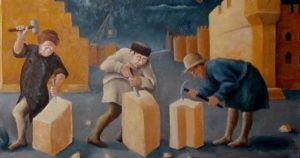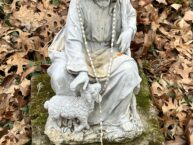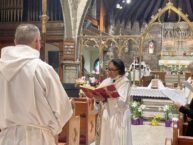 February 19, 2017: May God’s words alone be spoken, may God’s words alone be heard. Amen.
February 19, 2017: May God’s words alone be spoken, may God’s words alone be heard. Amen.
There is an old story about a tourist visiting Italy, who came upon a construction site. “What are you doing?” he asked three stonemasons.
“I’m cutting the stone,” answered the first.
“I’m cutting stone for 1,000 lire a day,” the second said.
But the third said, “I’m helping to build a cathedral!”
“I’m helping to build a cathedral!”
Or put another way… Antoine de Saint-Expury, author of The Little Prince, said “A rock pile ceases to be a rock pile the moment [one] contemplates it, bearing within [them] the image of a cathedral.” And it is this that we need to keep in mind when we hear the words of St. Paul and Jesus this morning.
In the part of St. Paul’s first letter to the church in Corinth that we heard this morning he is telling us that we are the temple (or cathedral) in which God resides. God is within us. He writes “Do you not know that you are God’s temple and that God’s Spirit dwells in you?”
This was radical stuff in the age when the temple was not only still standing, but considered the dwelling place of God. Paul is claiming the radical gospel that to know God, we don’t have to look far, because each of us was born rooted in the foundational wisdom or our Creator. You see, what he was trying to tell us, is that our bodies, our very lives, are crafted on a foundation of God – whose Spirit dwells within – and if we are open to it, will guide our actions in the world to be who we were meant to be – images of the divine seen by others through our actions. We are God’s temple – God’s temple is holy – we are holy.
Imagine that for a moment.
Sit with that and really think about what that means – you, every single one of you, all you’all are living, breathing, vessels of God. How might that change you, change your view of those around you, change the world? Because if you really think about it, what Paul is telling us is that everything we do, our actions in the world, is not without consequence, because our actions reflect on the one who created us – what we say and do matter, because we are the living carriers of God’s Spirit in the world. Every act is important. Every cut of the stone is part of building a cathedral.
Paul has been talking in this letter about the wisdom of God vs. the wisdom of the world, and one of the ways in which we seem to lose sight of this today is in believing that we can work out on our own what we are supposed to do in this life. We start to talk more, and listen less, especially to God and to one another. And the result of our inability to listen can be catastrophic for ourselves and for the world. We begin to lose sight of who we really are, and begin instead to see ourselves in the reflection of the world around us. But we are called to be much more, to be our true selves. That is what Jesus is talking about in the gospel today too.
In this week’s episode of the Sermon on the Mount (which does indeed have the length and feel of a multi-week mini-series you might binge watch on Netflix), Jesus strangely says that we should be perfect as God is perfect. Now, as I have said before about that passage, “the problem is that we are putting a 21st century English language lens on a 1st century Greek word – never a good idea. You see the word Jesus is said to have used was τέλειοι, or Telos, which means fully complete, whole, mature, true. To the ancient Greeks, it meant to be good and in harmony with all things. Essentially it means to be what we were born to be. So, the Telos of a caterpillar is to become a butterfly. The Telos of a fruit tree is to grow fruit. The Telos of every human being is to be the divine presence in the world. Jesus wasn’t telling us to live up to an impossible ideal (sorry to disappoint all you perfectionists out there). No, Jesus was talking about something far more radical than that. He was calling us to be true to who we are.
What would that mean for us if perfection, some overly idealized piety, wasn’t the goal of our spiritual lives, but rather being a better temple in which the Spirit of God dwells, a better incarnation of God’s love in the world? A better embodiment of Christ?
See, “the radical claim of the incarnation is that there is something about our identity and God’s identity that are so intimately linked. God has worked out God’s presence in this world…through us! We are that presence.”[1]
And here’s the kicker…this isn’t an exclusively Christian thing. God created all of humanity. God’s spirit dwells in every living human being. Think about that!
We, as Christians, are given a foundation on which to live out our identity in the world – the foundation of Jesus Christ. Others are given by God different foundations – from Abraham & Elijah, to the Prophet Muhammad (peace be upon him). And because of that, it is up to each of us to recognize and acknowledge the divinity that resides in our brothers and sisters all around the world. In fact, in just that gesture, we can do miraculous things.
During our Theology on Tap, two of our participants shared that at one point in their life, they experienced how profoundly life-changing it can be when someone sees you – really sees you –one adding that she now makes it a point to make eye contact with people, to say hello, to open the door for someone. She said “I try to see the Christ in them.” It changes her, and I think it changes the world.
There is a Sanskrit world, Namaste, that is now so popular to use, its meaning has been lost a bit I fear. Namaste is usually spoken with a slight bow and hands pressed together, as many do to pray. In Hinduism it means “I bow to the divine in you.”[2]
“I bow to the divine in you.”
I wonder what our country would be like if instead of shaking hands, gripping in such a way as to show strength, we would bow and acknowledge the divinity in the person we are greeting. I think it would life giving to us, and to our nation.
Paul is telling us we are the temple, built by God, in which God’s Spirit dwells. Jesus is imploring us to be true to who we are. But perhaps we may hear it more clearly this way. “Martin Luther [whose saint day was yesterday] once said that the Christian life is not about arriving but always about becoming. And Augustine at the Lord’s Supper would invite people to “receive who you are” and then “go become what you have received.””[3]
“Receive who you are” – in the Eucharist, “go become what you have received” – the body of Christ in the world.
If the Spirit of God dwells in us, and we are true to who we are, what would that look like? How might that change us and the world if we lived as if we really knew that our Telos, our very identity and purpose, was to be the walking, talking, acting, Spirit of God in the world? I think our perspective of what we do would be forever changed.
We would see our lives as building cathedrals as we cut stone – and we would be right.
See, this being true to our identity isn’t about grand gestures of piety, but about understanding the importance of our lives – to God, and to our brothers and sisters in the world. Every single person on this earth matters, and should matter to us, if we are living as God intends – as temples of the Holy Spirit – as incarnate images of God’s unconditional grace and love – because it means that they are as much our responsibility as they are God’s responsibility. Think about that – really think about that.
And in this difficult time in which we live, it is now more than ever that we must see ourselves for who we are, and live into that. Because right now, our brothers and sisters are suffering, God is weeping, and we cannot sit here in the comfort of our pews believing that is enough. It is not.
Frederick Douglas, the prophetic activist against slavery (who, by the way, is dead…in case the words of our President might have led you to believe otherwise), is a saint of the church. We celebrate his life tomorrow, and he once said ““The American people have this to learn: that where justice is denied, where poverty is enforced, where ignorance prevails, and where any one class is made to feel that society is an organized conspiracy to oppress, rob, and degrade them, neither person nor property is safe.” I would add that any Christian who does not see injustice, who turns a blind eye, who walks away from their brothers and sisters in need, is trying to keep a safe life, at the expense of their souls.
If we truly believe that all people are creations of God, than we cannot sit idly by while they are marginalized, for if we do, than we turn our backs not only on them, but on God – the image of God in which they were made, and the Spirit of God dwelling within them. And so we must, as a people of God, act – because our identity is known to the world by our actions. We are known by what we say, and most especially what we do.
There’s a now famous story…I can’t verify it’s accuracy, but it makes this point rather well, I think. “The renowned artist Paul Gustave Dore (1821-1883) lost his passport while traveling in Europe. When he came to a border crossing, he explained his predicament to one of the guards. Giving his name to the official, Dore hoped he would be recognized and allowed to pass. The guard, however, said that many people attempted to cross the border by claiming to be persons they were not. Dore insisted that he was the man he claimed to be. “All right,” said the official, “we’ll give you a test, and if you pass it we’ll allow you to go through.” Handing him a pencil and a sheet of paper, he told the artist to sketch several peasants standing nearby. Dore did it so quickly and skillfully that the guard was convinced he was indeed who he claimed to be. His work confirmed his [identity]!”[4]
What do your actions say about you?
Do they reflect the Christ in you, and in others?
Do they honor the Spirit of God that dwells in you?
Today, there are two marches in solidarity with refugees, immigrants, and Muslims. One is in New York City, the other in Clifton NJ. The one in New York actually asks us to claim an identity as a way of standing with our Muslim brothers and sisters – to claim “I am a Muslim today.” This is profound, and it is exactly the kind of statement that recognizes the divine Spirit in all people – for a Christian to stand in solidarity with Muslims and say “I am a Muslim,” or with our Jewish neighbors and say “I am a Jew.” This doesn’t deny our Christianity – it lives it! And these are just two of the many actions arising in response to the growing level of hatred, bigotry, and heartlessness here in this country, and around the world. Perhaps you will join one of these marches, and this will be one of the stones you will cut in the building of the cathedral that is your life.
Or perhaps you will volunteer to distribute ashes on Ash Wednesday at our local train stations. You know, a few years ago, before I was your rector, I interviewed a couple of you about your Ashes to Go experience as part of a diocesan video on the A2G movement as it is called. One of the stories was given by David Drislane about a woman who was commuting home after work, saw them standing there offering ashes to people as they came off the train. She went over to them and after receiving the ashes she asked, nearly weeping, for a prayer. You see, her father was really ill, and she was at her wits end. They gathered around her and prayed. Another way to cut that stone, to build that cathedral that is your life, to build up the cathedral of others.
Others of you bring bags of food or pet supplies with you to church on Sundays to be given to the local food pantry and animal shelters. Still more offer rides to parishioners, visit the sick, and care for the lonely.
In a world in which there is so much need, where the temple of God in our brothers and sisters is being eroded through hate and abuse, or where the earth and the creatures God created are abused and discarded, we have so much work to do if we are to be true to our identity. If we are to be the living temple of God’s Spirit – the incarnate body of Christ alive in the world today. If we are to help build up the cathedrals of our own life, and those of others.
Many of you have been on the forefront of social justice for a long time – living out a life of prophetic witness. Others are just getting started in the wake of this most recent darkness that has crept over our country. But either way, whether we are long time advocates, or painting our first protest sign, whether we engage on the streets or in the soup kitchens, whether we are young or old, part of a marginalized group or an ally, this is the time to be cathedral builders, to act – to be true to who we are…
- agents of transformative love in the world
- the image of God
– the temple of the Holy Spirit
– the body of Christ.
Amen.
For the audio from our 10:30am service, click here:
[1] Sermon Brainwave.
[2] Wikipedia.
[3] David Lose.
[4] Our Daily Bread, January 6, 1993.
Rev. Diana L. Wilcox
Christ Church in Bloomfield & Glen Ridge
February 19, 2017
The Seventh Sunday After The Epiphany
1st Reading – Leviticus 19:1-2,9-18
Psalm 119:33-40
2nd Reading – 1 Corinthians 3:10-11,16-23
Gospel – Matthew 5:38-48






